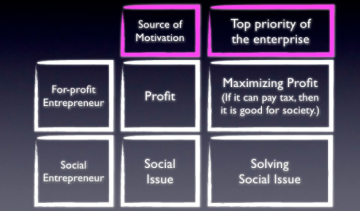
Social entrepreneurship is a type of entrepreneurship in which the main goal is to develop, fund and implement solutions to social, cultural, or environmental issues. Social entrepreneurship denomination can be applied to a wide range of organizations, which vary in size, aims, and beliefs. It includes non profits community interest companies, benefit corporations and many other types of companies. In this guide in 4 parts we give an overview to this sector, including key concepts, history, various fascinating case studies and examples, and practical resources such as what alternative sources of funding serve social entreprise and how these companies can find ways of certification.
Part 1 – Introduction to Social Entrepreneurship
What is social entrepreneurship
In 2007 in a trip to India, something happen to Adam Braun, that would change is life. Kneeling down to speak to a local kid, he asked him what he wanted most. And he asked for a pencil. This triggered something in Adam’s heart. Adam commited himself to found an organization to help kids like that little boy. One year later, in 2008, he founded “pencils of promise”, an organization that builds schools and increases educational opportunities in the developing world.Pencils of Promise operates mostly in Laos, Guatemala and Ghana, and is an example of a social entreprise.
Social entrepreneurship can be defined as an innovative hybrid business model that seeks to maximise positive social, human justice and/or environmental impact while satisfying a financial return. Social entrepreneurship aims to create positive change and it is growing as a mindful business practice of the future. Social entrepreneurship also benefits from the use of innovative new digital technologies. These types of ventures utilise creativity and innovation to bring social, financial, service, educational or other community benefits.

These companies are then seen as entreprises that provides business solutions to social problems, with a clear social purpose.They also reinvest profits back into the business/community.
Are social enterprises non profits ?
Some state that social enterprises are not charities or welfare agencies.They are private businesses established by entrepreneurs with an emphasis in human values rather than just profit. But this sector is unclear, and some academics classify non profits/charity sector, as part of the social entrepreneurship ecosystem.

Social Capital
An important characteristic of these businesses are how they work on enhancing the social capital within the community, by encouraging participation, inclusion and utilising a bottom-up approach to achieve social change. Since these businesses are created to provide benefits for a community, they see community and usually disowned and disempowered parts of it, as social capital. This makes problems turn into opportunities, to help people empower themselves.
These compoanies tend to be aligned and working along the way of the United Nations 17 sustainable development goals (SDGs). The more business oriented ones, use sound business commercial practices to ensure sustainabiiy.
These are companies that serve a specific mission, but that mission needs to be deeply aligned with the values of the social entrepreneur. They encourage environmental and ethical practices.

The Social Entrepreneur
An important figure of social entrepreneurship is the social entrepreneur. One example is Bill Drayton, the founder of Ashokha, the renowned foundation supporting social entrepreneurship. He speaks widely about the role of the social entrepreneur as a change maker.
“Social entrepreneurs are not content just to give a fish or teach how to fish. They will not rest until they have revolutionized the fishing industry.”
Bill Drayton
Social entrepreneurs are then seen through the eyes of the hero narrative. As such, their main characteristics are
- Being path breakers
- Ethical fibre
- Pragmatism and Professional Skills
- Seeing opportunities where others see empty buildings
- Radical Thinking
- Making Markets Work For People
- Savvy at working collaboratively
What are the main qualities of Social entrepreneurs?
- Innovative
- Resourceful
- Results oriented
- They draw upon the best thinking in business and
non profit worlds to develop strategies
that maximise their social impact.

Criticism to Social Entrepreneurship
Its not all positive in this sector, and some point out important criticism to the field of social entrepreneurship. The vision of social entrepreneurs as heros, can ignore vital community with involvement. There can be as well depoliticalisation of social problems as very effective social entrepreneurs can let governments “off the hook” of their responsibility of using taxes to solve important social issues. Other authors
(Carter and Jones- Evans, 2006) point out the negatives of selling out of social action – businesses processes. This can happen in more ambitious social entrepreneurial projects where there is the tendency to seek high – impact interventions that can lead to “unsustainable project-based approach”. Finally, a constant strategic focus on innovation and change can lead to overvaluation of potentially short term objectives
Key Take Aways
Social Entrepreneurship is a new paradigm of social value creation. It reflects a dynamic revolution in the social sector and its importance is being increasingly recognised in the corporate sector.
Social entrepreneurs recognise social problems and use traditional entrepreneurial principles. They address complex problems, with triple bottom line approaches.
Key social entrepreneurship drivers
- Social issues inadequately addressed by Governments
- Need to raise funds for charities
- Growing demand for corporate social responsibility and ethical entrepreneurship
Key Strategies
- Be good at spotting and reusing resources that are underused or abandoned.
- Make mistakes and learn from them.
- Manage the cash flow
- Learn the latest digital marketing techniques
- Develop networking abilities
Part 2 of this guide will be posted tomorrow

Maria Fonseca is the Editor and Infographic Artist for IntelligentHQ. She is also a thought leader writing about social innovation, sharing economy, social business, and the commons. Aside her work for IntelligentHQ, Maria Fonseca is a visual artist and filmmaker that has exhibited widely in international events such as Manifesta 5, Sao Paulo Biennial, Photo Espana, Moderna Museet in Stockholm, Joshibi University and many others. She concluded her PhD on essayistic filmmaking , taken at University of Westminster in London and is preparing her post doc that will explore the links between creativity and the sharing economy.










